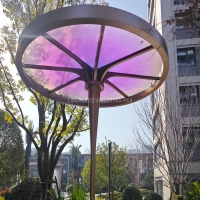Welcome to the website for landscape facilities products and knowledge.
How does the choice of material impact the overall resistance to scratching from glassware or utensils?
The durability of surfaces against scratching from glassware and utensils fundamentally depends on material selection. Materials with higher hardness ratings on the Mohs or Vickers scales inherently resist abrasion better than softer alternatives. For instance, engineered quartz with resin binders typically withstands cutlery contact better than natural marble due to its composite structure. Surface treatments like ceramic-based coatings or nano-polymer layers can enhance scratch resistance by creating protective barriers that dissipate pressure from pointed utensils. The coefficient of friction between materials also plays a crucial role—smoother surfaces often experience less abrasive damage from glassware sliding. Thermal expansion properties determine how materials respond to temperature changes from hot utensils, affecting long-term structural integrity. Manufacturers often employ accelerated testing methods simulating years of utensil contact to validate material performance. Ultimately, the interplay between material hardness, surface engineering, and maintenance practices determines practical scratch resistance in real-world scenarios.
Related search:

Recommendation
Metal frame with gradient color acrylic combined with high-end shading landscape facilities